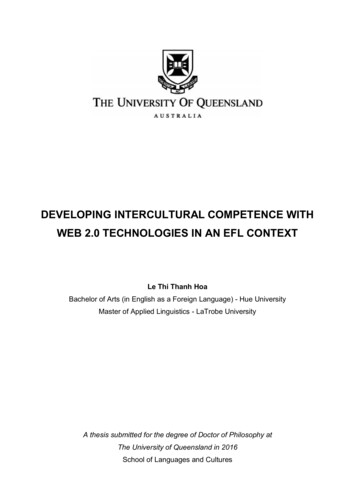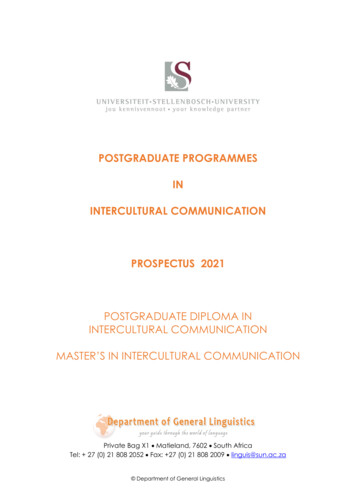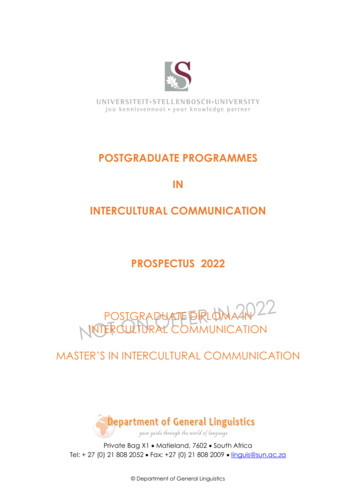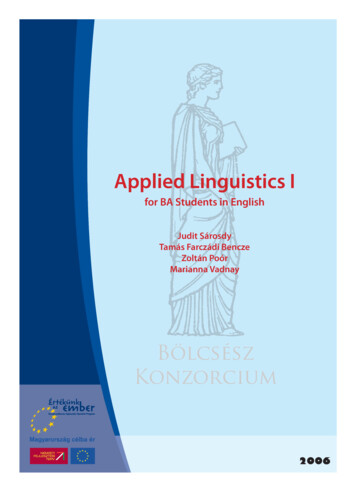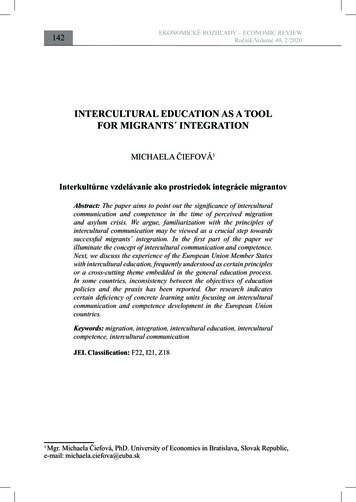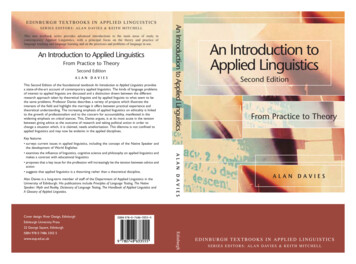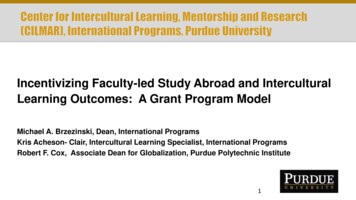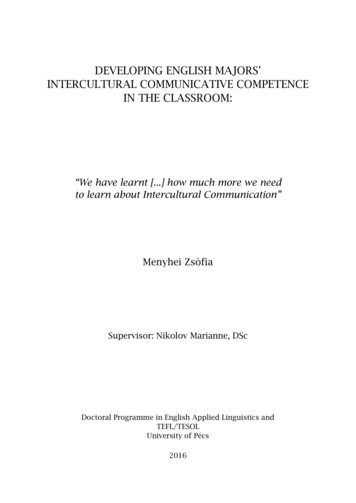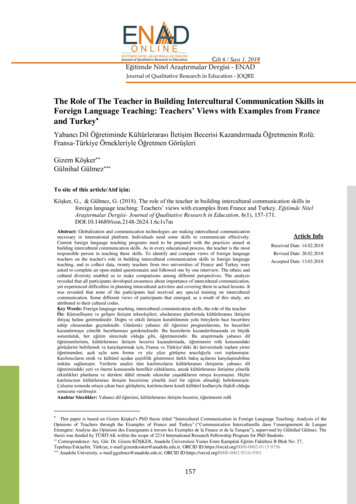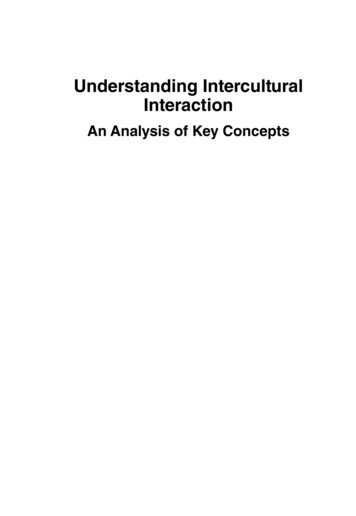
Transcription
International Journal of TESOL Studies (2021)Vol. 3 (4) 200-209 ntercultural Communication and Applied linguistics - ExtendingHorizons: An Interview with Lixian JinLun Peng (Gloria)China Daily, ChinaAbstractAt the start of this interview, Professor Jin recounts how she abandoned her ambition to becomea physician and ended up teaching and researching clinical linguistics at a British university for18 years. She emphasises the crucial role of intercultural communication (IC) in both foreignlanguage education and the ‘internationalisation’ of universities; in connection with the former, sherecommends some ways for EFL teachers to promote intercultural communication competence(ICC) in their TESOL practices; regarding the latter, she points out that for a university to be‘internationalised’, true IC is indispensable as it can bring all partners (i.e. academic, administrative,technical staff and students) up to a level where they understand, empathize and appreciate eachother. In her current role as Dean of Faculty of Humanities and Social Sciences in the City Universityof Macau, she has been leading a group of faculty members to work on proposals to establish AppliedLinguistics programmes for BA, MA and PhD levels, in order to support the infrastructure of futureworkforces in Macau and the Greater Bay Area. Additionally, in the Chinese EFL context, she discussesseveral key issues concerning teaching English to young learners and to older learners (aged 50and above). Finally, she offers some advice regarding how to balance the teaching, research, andadministrative responsibilities expected of a faculty member in the field of applied linguistics.KeywordsIntercultural communication, applied linguistics, TESOL, life-long learning, the Greater BayArea, MacauWe would like to start off on a more personal note, Prof. Jin. I would first invite you to talkabout your academic and professional life highlighting how you got interested in AppliedLinguistics and TESOL.This is a long story. English was not my original career choice. I wanted to become a medical doctor. Butfate has taken me on a pathway of English and then to applied linguistics and TESOL.At school, it was not possible for me to learn English properly. At that time (in the ten -year turbulentperiod (1966-76)), schools were closed for long periods or opened but with little teaching. What weAddress: No 15 Huixin Dongjie, Chaoyang District, Beijing, 100029, ChinaEmail: penglun@sina.com
201International Journal of TESOL Studies 3 (4)learned, intermittently, was from an English textbook which highlighted political slogans. We had tomemorise those words to pass the exam, but we did not really learn listening or speaking, reading orwriting. Later, I hardly attended senior high school. I went to study traditional Chinese medicine outsidethe school, wanting to become a barefoot doctor. Then I worked as a replacement teacher for one year ata local primary school. I taught Chinese and Maths and, somehow, taught English to the middle schoolyear one class attached to the primary school. A year later, it was back to Chinese herbal medicine: I wasassigned to work in a traditional Chinese medicine faculty, but everything changed when I passed thefirst National University Entry Exam in 1977 and was luckily admitted to study English literature andlanguage at university.So how about learning English in these circumstances? During my brief schooling and factorywork time, my parents were very wise. They heard me reading English sentences with awful Englishpronunciation, so they found an old friend to help. He was an English teacher. I used to go to his houseevery Sunday morning to learn some English and the rest of the time I was supposed to do home-studyalone. But mostly I was simply exhausted, because in the factory I was often required to do extendedwork hours (from 7am to 9pm, six days a week). I worked as a construction labourer to move bricksand soil for the factory building, as an assembly line worker to wrap labels on medicine bottles, as amechanic apprentice (a very much admired job then) with which I learned how to fix some mechanicalequipment, to do welding to repair high chimneys, and to design and make moulds; as a herbal-extractionworker to produce Chinese medicines for intravenous injections. Sunday was the only time to catch upon sleep or daily life. Again, I hardly had the opportunity to hear English, although the teacher speciallycorrected my pronunciation here and there. We hardly finished one textbook during the years of studyingwith him. When we heard about the chance to go to university, this English teacher and another Englishteacher from my middle school both encouraged me to attend the exam - for the English major. All Iknew was that I wanted to study in a university: I did not care what subject it might be. By that time, myfather had passed away. My mother was still suffering under the consequences of the ten -year turbulentperiod, so I had no-one else to turn to. My mother had no income. She wanted me to keep my ‘good’steady-income job as a Chinese medicine factory worker. So, I had to do my English revision and exampreparation secretly, outside in a street under the street-light whenever I had time.Fortunately, I managed to pass the exam successfully. Nevertheless, my mother was strongly againstthe idea for me to go to a normal university: for her, having a good factory job was the best choice.She worried about our income situation. Luckily, to allow me go to study, my uncles agreed to supportmy mother’s living expenses. However, when I got to university to study English, I could hardly say aword, not even to reply to greetings. It was embarrassing. At first this was a great struggle – everyonewas better than I was at English. But I worked hard in class and especially out of class: I grabbed taperecordings to listen to English for as many hours a day as I could, plus reading texts, reciting passagesaloud, learning vocabulary, and talking to myself even in my dreams. Once I understood some Englishwords from the film The Sound of Music, I was so excited and felt proud. I have been watching thisfilm many times since, and I still get the same feeling of contentment and satisfaction. A good classmatehelped me practise my oral English: we’ve remained life-long friends. Another piece of luck was to havetwo American teachers (at that time, a handful foreign teachers were assigned to teach English majorsat only three universities in the whole Hubei Province), and the best Chinese teachers of English. Theydevoted their time and energy to teach us.After a year or so, my English had improved a lot. I won the university English-speaking contestsa few times. This gave me the confidence to develop a special interest in English pronunciation. Everywinter and summer holiday, I went to Beijing to join my uncles’ families. They were all good at Englishand they supported me to study well. During those visits, I used to take notes from the limited linguisticbooks available in the Beijing library. I read about the concept of clinical linguistics one day. I thought itwould be wonderful if I could study clinical linguistics, then at least I could use some linguistics linked
Lun Peng (Gloria)202with medical sciences, since I had always wanted to become a medical doctor. By chance - or fate years later, my first full-time job in a British university was to teach clinical linguistics to train speechand language therapists in a health and life sciences environment. For this, I had to seriously study thecontent before teaching it. I was well trained as an applied linguist and a linguist, but this does not meanI could teach every subject in the fast-expanding field of applied linguistics. Well, I did that job for 18years and conducted research in clinical linguistics.Going back to my university time in China, by graduation for my first degree, my English wasconsidered ‘competent’. My oral English was fluent and I was acting as an interpreter at universityinternational meetings. My graduation dissertation on The Problems of Wuhan People in LearningEnglish Pronunciation, considered the best BA dissertation, was published as a journal article in the1980s after going through many reviews and some special approval by a well-known professor inlinguistics (I was considered too junior to be allowed to publish an academic paper). So, this was my firstacademic publication. I was appointed to stay on as a university English teacher, specialising in EnglishPhonetics and Phonology. I taught there for nearly 5 years before I left to do my MA and PhD in AppliedLinguistics and Education in the UK, with the first non-government scholarship funded by several Britisheducational foundations (in itself another long story).You have done quite a lot of research on intercultural communication vis-à-vis TESOL. Canyou tell us a little about what got you interested in these areas, what your research hasfound and how your findings can help teachers and learners?To me, intercultural communication (IC) is a vital part of learning a foreign language. Students needto have the curiosity, patience and empathy to engage with a range of cultures. These qualities areworth developing for themselves; additionally, many students will be future professional languageusers. Cultures are parts of languages and languages are part of cultures. Learners need to appreciatethrough good examples in different contexts how different communities of English users (whether as afirst, second or other language, or as a lingua franca or global English) not only have different styles ofcommunication, but often different ways of conveying meaning, because their communication for sometopics is based on different assumptions and so their expression in discourse might be hard for others tofollow to get the main meaning without some knowledge and feeling about the people and their languageuse. Cultures create meanings but meanings also create cultures.When I was searching for a worthwhile research focus for PhD, I realised that Chinese researchstudents at that time in Britain were suffering a lot socially, psychologically and academically, eventhough they were from elite academic groups in China. They were confident that they were competent,but it seemed that they were not treated with respect by other students or staff. At the same time, Britishsupervisors also commented that Chinese students were the most hard-working, intelligent, and selfsacrificing students they had ever met. These supervisors wanted to help Chinese students achieve more,but they did not know how the students could get into relevant ‘Western’ ways of thinking for theirresearch or writing. So, for my PhD I decided to explore these intercultural academic gaps between theChinese research students and their British supervisors.My research findings have shown that there are different emphases in ways of learning, teachingand research: these are perceived by people coming from different social, psychological and academicbackgrounds and inherited learning methods and beliefs. This might lead to different preferences inlearning or teaching, e.g. tendencies to ask (or not ask) questions in discussion. Sometimes what isappreciated or valued by some academics (or other learners) may not seem important or relevant toother academics (or other learners). This is partly influenced by their cultural beliefs: about what agood student or teacher is, what is considered good learning or research, or how they should interact in
203International Journal of TESOL Studies 3 (4)academic settings. For instance, to ask a question of a superior (a teacher or supervisor) may be perceivedas impolite or inappropriate in academic settings by some Chinese students. They might think that the actof asking a question is itself a challenge, so they would not dare to ask questions with their supervisors,even if they see alternatives or have doubts about the ideas presented. They may be reluctant to ask anyquestions at all. I refer to this preferred academic behaviour as cultures of learning, because ways oflearning vary, culturally, around the world. It means IC includes cultural learning, of course, but it alsoincludes learning about other’s learning.So Intercultural communication (IC), as a large field, includes the interaction in language learningand teaching. I mean, language learning depends on cultures of learning and cultures of communicationand these can be surprisingly different around the world or even within one country or one disciplineof a university. How students learn and how teachers teach depends partly on their upbringing andsocialization, education and training, on what they think language is, and how they believe people shouldteach and learn. For example, in one case, textbooks have questions and teachers ask these or make theirown questions based on the book; students may give answers and sometimes everyone expects a singleanswer to each question: this answer is right or wrong (often confirmed as such by the answer given inthe textbook or teacher’s book). In this case, good learning means correctly answering questions, and thequestions are often about something already taught. In effect, this particular learning means reading andlistening in order to spot and remember answers to upcoming questions (e.g. for a test or an exam). Thiscould be an overlooked IC issue.In other cultures, there are cases where teachers (and students) perceive that many questions havea range of answers, so several different answers might be sought and discussed. In such cultures,educationally, teachers believe that students (not only teachers) ought to be asking questions: askingis a major way of learning. So, they develop techniques to encourage learners to ask and to be creativewith thinking about their own questions, and not only to recall answers to teacher-or-book questions.Teachers in this second case are disappointed if students don’t have questions: they think good teachingleads to learner questions, and that learner questions lead to accelerated, deeper or more emotionallyengaged learning. Good learners here should be eager to ask. In this kind of contrast, perhaps students inthe first case don’t ask, because the questions all come from the teacher or textbook. They are not used toasking. If a teacher does say, ‘Any questions?’ the students believe this is just a routine formula and it isnot serious; or they don’t want to interrupt the teacher; or they might think that to ask a question showsignorance (rather than eagerness for knowledge and interaction) and perhaps they are afraid of negativecomments from their peers.So, this question of questions can be one small part of different cultures of learning. The concept ofcultures of learning does not necessarily mean it has to do with learning styles or other aspects of culturesof learning between countries/communities, but it can be within one cultural community of a country,or these can be experienced through reflection even within individuals during their journeys of learning.Internationally, these cultures involve ways of developing intercultural communication in the actualmoment-to-moment teaching and learning. So, IC is not only something outside the classroom, or onlysomething for preparation for a future profession using English: it’s in the classroom process and in dailyinteraction between teacher and class or between different groups of students, as well as communicatingin English outside class. If the classroom process does not involve practical IC and intercultural thinkingin some way (e.g. developing repertoires of ways of asking in intercultural situations in role playing) it isless likely to be effective in the real world.In your keynote presentation Internationalisation in HE? Not without interculturalcommunication 1, you have mentioned that intercultural communication might becarried out within a framework of internationalisation. Could you elaborate on it?
Lun Peng (Gloria)204Internationalisation has been perceived as essential in business contexts and later in education sincereceiving international students and having international collaboration has become a part of therating mechanism for league tables in university ranking. But what I have been arguing is that thisinternationalisation is not just a matter of student numbers, or university income, or points for reputationand status. More significantly, there should be substantial support for mind-and-heart internationalisationin business or education. It means developing a profound sense of ‘planetization’, a deep awarenessthat all nations and peoples are all on the same planet, interacting with each other and within thesame global environment. It means international and local students learn culturally from each other.It means teachers as professionals (and students as future professionals) need to develop interculturalcommunication competence (ICC) in order to achieve a real sense of internationalisation, cognitively,emotionally, socially and culturally. When international students (and staff) are in a university, this doesnot necessarily mean the university is ‘internationalised’ unless true intercultural communication takesplace to bring all partners (i.e. academic, administrative, technical staff and students) up to a level inwhich they understand, empathize and appreciate each other, not only in their work roles but as peopleon one planet.I have brought in the argument of having awareness of cultures of learning and teaching. This hasthe aim to help make university a synergetic place, in which both staff and students treat each other withopenness and curiosity about each other’s repertoires of learning and teaching styles to make educationtruly international in curriculum, in thinking, in practice. This helps to create future professionals readyto serve the global workplace. People may argue that international students go to study in a Britishuniversity, because they want to be educated by British ways. But what are British ways? Historically,and now, British businesses and society generally have been absorbing many resources internationally.In a reverse argument, staff in a British university might not learn all the styles of learning from allinternational students (and of course so many other aspects of cultures and worldviews). But the aim isnot for one person to learn all styles of teaching and learning (and about all cultures). This is impossiblein reality. But it is possible for staff and students to learn some principles for being aware of variouspreferred styles of teaching and learning. More importantly, to establish an open channel to explicitlyexplain their own thoughts about teaching and learning, while learning from and with others. Even ifeach participant insists on their own preferred ways of teaching and learning (which may be consideredas their right), they would provide explicit information and insight so that other participants would makeinformed choices of learning and teaching. This strand of internationalisation is important because itsuggests a teaching-and-learning process, a stance of investigation and imagination, as central to theinternational purpose and improved functioning of a university.What does intercultural communication mean? What role should interculturalcommunication play in TESOL? How should English language teachers promote EFL/ESLlearners’ intercultural competence?I have answered parts of these questions earlier. I would like to focus on the ways for ELT teachers topromote intercultural communication competence (ICC) in their teaching to EFL/ESL learners. Thereare many ways to teach and learning IC. Here I only mention three points which we often apply intoour teaching. First, teachers will help students understand the broad concepts of what culture is, of whatcultures do, and how cultures make and communicate meanings. This is not necessarily about differentnational cultures, but it could relate to students themselves, e.g. coming from different parts of thecountry or different cities or family backgrounds. Culture is partly about people’s expectations, attitudes,preferences and perceptions which influence their thoughts and chosen behaviour. So, when we interactwith people, we need to be open to others’ views, to be aware of alternatives when we interpret their
205International Journal of TESOL Studies 3 (4)behaviour and learn to think from others’ perspectives, while postponing judgements. Secondly, teacherscan be good examples of performing ICC in their teaching by guiding students to explore IC cases withthoughtfulness and empathy. Thirdly, teachers can raise students’ sensitivity, curiosity, openness andawareness of intercultural issues for effective communication purposes. For example, in my teaching,I ask students to create their own lists of ‘key IC ideas’ or ‘rules’ by producing their own acrostic toremind themselves of IC in their daily action. For instance, some students in a group made an acrostic ofRESPECT:Recognize differences between individuals;Evaluate everyone’s behaviours without discrimination;Smile is a good beginning to show your kindness;People should think about issues from each other’s point of view;Explanation is a way to solve misunderstanding and conflict;Controlling your emotion is necessary in communication;Try to be patient when facing difficulties.Students work through IC theories in discussion. They read other’s groupwork to internalise their own(and other’s) understanding and create their own ways to think and behave in IC.At De Montfort University (DMU), UK, you developed one of the few UK Master’sprogrammes on Intercultural Business Communication and established an interculturalresearch centre for learning and communication. Can you share with us the interesting/challenging bits of this experience?Around 2009 I initiated this innovative programme. There were just two similar programmes in theUK then. People did not know what this programme was about and why ‘intercultural’ was part ofthe degree title. I had to convince different university committees that ‘intercultural communicationcompetence’ can be decisive for success in a business negotiation. We need to educate students whoare able to handle intercultural business with communication competence, intercultural understanding,integrated with business or professional knowledge. I got some funding from the UK Prime Minister’sInitiative fund: the findings demonstrate how business needs a trained workforce with ICC for theirglobalised work contexts.I also faced a problem of where to locate this programme, since it involved staff from three faculties:Humanities, Business and Health and Life Sciences (where I was affiliated with). I wanted to locate itin my faculty, because the research and teaching could also link with speech and language therapy andother health professions trained in the faculty. In the end, the university agreed with my reasons that thisprogramme would remain in the Life and Health Sciences Faculty, so I set up a teaching and researchcentre called Centre for Intercultural Research in Communication and Learning (CIRCL). Staff werefrom different faculties to be truly intercultural and interdisciplinary. Intercultural problems were solvedthrough intercultural communication and action. The programme included many international studentsand many visiting scholars from China participated.In your current new position as Dean of Faculty of Humanities and Social Sciences in theCity University of Macau (Macau SAR, China), do you need to develop a similar master’s ordoctoral programme in the broad area of Applied Linguistics? What are your visions for thenew programme(s) at your current institution? What difficulties do you need to address?
Lun Peng (Gloria)206In my first month of arriving at the City University of Macau in August 2021, I led a group of staffmembers to work on proposals to establish Applied Linguistics programmes for BA, MA and PhDlevels. We worked day-and-night for 20 days to produce over 50 documents for this application. There iscurrently no Applied Linguistics programme in Macau. It is timely to establish programmes at all levelsto support the infrastructure of future workforces in Macau and the Greater Bay Area.The Applied Linguistics degrees include different strands: for the BA, two strands are proposedwhich are on Language in Education for those who would like to develop their future career in ELT andon Intercultural Communication for those who would like to use IC for their professional development;for the MA, four strands are planned: TESOL, TCSOL (Teaching Chinese to Speakers of OtherLanguages), Teaching Languages to Young Learners, and IC. The main consideration is that thesespecialities are currently not available in education in Macau and the graduates would be able to fulfil thelanguage needs locally, as well as in other areas of China (including the Greater Bay area) and elsewhere.As applied linguists, we aim to solve problems in education and other fields. In order to achieve the goalsof meeting the educational and professional needs, we have designed work placements in all our degreeprogrammes. Of course, this can be challenging: we are considering suitable work placement locationsso that our students will benefit from applying their knowledge and skills into real world settings. We arealso facing some difficulties to expand our staff expertise. Currently we are recruiting a large number ofacademics from lecturer to professor levels. We welcome talented academics to join us for the mission ofproviding good education for Macau and the Greater Bay Area.In China, the number of English learners/users already exceeded 390 million in 2000(Wei & Su, 2012). There are 60 million Chinese primary school children (China Education2013) learning English at the age of nine or even younger (e.g., seven).To what extent isthis popular TESOL-related belief true that ‘the earlier, the better’?This is a complicated question. People may know that the ‘critical period hypothesis’ has influencedsome decisions about early starting for learning English. Some primary schools in China start theteaching of English from Year 1 and some choose to start from Y3. There are several issues we need toconsider for teaching English to young learners (EYL).Firstly, this is not simply a question of timing the starting age for learning English; how we teachyoung learners is a more important issue. This is a reason that the City University of Macau would liketo develop this strand of teaching EYL in order to produce specialists who can handle this teaching moreeffectively as teachers. The learners are young and usually keen to learn any knowledge and skills; if weteach them as if they are adult learners (e.g. focusing on testing them, or forcing them to learn grammarrules, or mainly memorizing) we will kill their enthusiasm for learning. I have conducted a series offunded projects investigating motivations of English learning from kindergarten to university studentsin China. A major finding shows children need to be motivated to learn according to their emotional,intellectual and cognitive development, with a good support in social, psychological and educationalprovision. Children are aware of different difficulty levels in learning, but learning needs to be scaffoldedso that they can use their own learning pace and readiness to progress. Teachers pay attention to individualneeds, so they need to use multiple techniques fitting with children’s developmental stages in learning.Secondly, successful language learning for EYL relies on a positive linguistic environment. Ininternational schools in China, where English could be the medium of teaching, these children wouldhave a wider and richer exposure to English. In state schools, where children’s English learning may berestricted to a couple of hours per week, this provides relatively little input to their learning. If they donot have other sources of English in their learning environment, it would be hard for them to acquire
207International Journal of TESOL Studies 3 (4)language skills. Thus, the best option is to nurture and sustain their interest in English through engagingactivities and let them develop more rapidly when they are ready; meanwhile for EYL, schools canprovide many short out-of-class activities and things-to-do-at-home in English (with support, parents orgrandparents might be involved). Our research shows young learners are particularly keen when theycould learn English together with their parents, as a rewarding time to spend with their parents.Thirdly, teachers of English need to have regular professional training and development. In China,quite a number of provinces provide annual training plans for English teachers to update their knowledgeand techniques for teaching EYL. At the same time, it may be informative and insightful for Englishteachers to learn from teachers of other disciplines (e.g. from teachers of Chinese) or learn fromobserving and collaborating in teaching styles from other levels of education, e.g. university teachersobserve and collaborate with Senior High teachers in order to understand students coming from there touniversity level; Junior high school teachers may observe and work with primary school teachers, andprimary school teachers of EYL may link with kindergarten teaching to understand how children developtheir learning, and become familiar with different teaching styles from different educational stages.When your research subjects include very young learners, did you have any difficulties insoliciting the cooperation of your research subjects? How did you overcome these difficulties?This is a useful question to many researchers who are interested in young learners, not just for EYL. Wehave use
Phonetics and Phonology. I taught there for nearly 5 years before I left to do my MA and PhD in Applied Linguistics and Education in the UK, with the first non-government scholarship funded by several British educational foundations (in itself another long story). You have done quite a lot of research on intercultural communication vis-à-vis .
